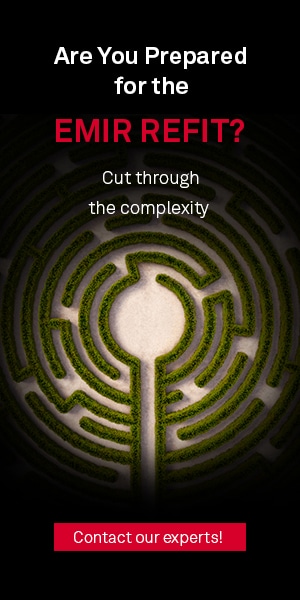
What is delegated reporting in EMIR and can it save my firm money?
In today’s blog post on the EMIR derivative trade reporting mandate we take a look at delegated reporting. For full disclosure, the parent company of this blog, Cappitech, provides delegated reporting services to help firms automate their EMIR and MIFID II reporting requirements.
What is delegated reporting?
Within EMIR, the framework requires firms to report their over the counter (OTC) and exchange traded derivatives (ETD) to a trade repository. Currently numbered at six, trade repositories collect, manage and secure the derivative data and make it available to financial regulators of the European Economic Area (EEA) to enforce EMIR.
Along with creating a framework for companies to report directly by themselves to a trade repository, EMIR rules allow for the use of third parties that are delegated to report OTC derivative and ETDs on the reporting firm’s behalf. The basis behind allowing for delegated reporting is that the EMIR reporting is part of a larger service being provided that simplifies the process for reporting firms.
3rd party delegated reporting examples
Banks – One of the most common cases of delegated reporting is through a bank. As banks are typically the counterparty to derivative trades with their customers, especially non-financial firms, many banks to report trades to trade repositories for both themselves and their customers. Typically provided as a free or low cost service to clients, delegated reporting is offered as an incentive by banks to make it easier for their customers to trade with them. However, bank clients are often required to open their own submission folder accounts at a trade repository of which there are minimum annual fees.
Clearing houses – Another example of where EMIR delegated reporting is offered as a value added feature for a larger service is for exchange members via their clearing partners. However, these services are slowly getting phased out as a number of exchanges are reducing their exposure to providing regulatory reporting services.
Service providers (The category Cappitech falls into) – The third example of delegated reporting is through service providers. Whereas banks and clearing firms lump EMIR reporting within other trade based services that they earn revenue from, service providers offer delegating reporting on their client’s behalf as part of a reporting solution.
Among the common reasons of hiring a service provider to help with EMIR is due to the complexities of reporting trades directly to a trade repository. These issues include creating a process for the daily collection of trade data, understanding how a firm’s derivative trade records fit within the data fields being requested by a trade repository and validating that the sent information has been reported correctly. Firms trading with multiple counterparty banks such as large corporates and asset companies, who don’t report on their behalf also need a system in place to aggregate all of these positions and counterparty information to comply with EMIR.
As a solution for the latter complexity, a number of treasury management solutions (TMS) and order management systems (OMS) include features to aggregate derivative trades. With this information, many OMS and TMS providers have developed modules or partnered with other technology firms to provide customers with the ability to report these trades directly to a trade repository or on their behalf through delegated reporting.
The benefit of these solutions that also integrate delegated reporting is the ability to increase efficiency in the ongoing EMIR compliance process. With this type of technology solution such as that provided by Cappitech, once it integrates with a trading platform, ongoing collection or data and reporting can be automated to handle most of the day to day EMIR requirements.
Cost benefits
When it comes to cost benefits, three main factors firms should consider when investigating whether delegated reporting is a fit. They are:
- Per trade fees charged by trade repositories
- IT and human resource costs associated with developing a process to report daily for EMIR
- Ongoing resources to handle the compliance process
For many service providers that provide systems to automate EMIR reporting, a common benefit is the ability to report on behalf of many clients. By doing so, they can take advantage of volume discounts to offer delegated reporting on behalf of their clients for much less than if the firm reported directly to a trade repository. For example, many firms that would incur expenses of $150,000 or more in annual EMIR related transaction fees, could use delegated reporting to cut the figure by 50-70%.
The drawback of service providers though is that there is nearly always a fixed setup fee or ongoing minimum expense per month for their solution. As such, firms with smaller transaction volumes may ultimately pay more in per-trade expenses when using a third party service provider compared to reporting directly to a trade repository.
However, even in this scenario, many reporting firms are still electing to choose a service provider and delegated reporting. The rationale in this decision is due to calculating that the human resource and IT costs associated with handling the EMIR compliance process is more expensive than delegating part of the process to third parties.
Things to consider
NFC- and EMIR REFIT
With the next stage of EMIR REFIT going into effect in June 2020, financial counterparties become responsible to report for Non-Financial Counterparties that are below the clearing threshold (more on REFIT).
NCA delegated reporting review
Under a larger EMIR data quality review that started in 2018, a number of NCAs have notified investment firms of problems with their EMIR submissions. In many cases, especially fund companies, notified firms have had their reports submitted by their bank counterparties. As such, companies need to have process in place to ensure that submissions being done on their behalf are correct.
If you are considering delegated reporting for EMIR or SFTR, feel free to contact us to learn more.
The blog was originally published in 2016 on Cappitech’s blog. Article image source tableatny on Flickr
Have a question about regulation or regulatory reporting?






